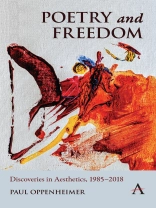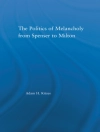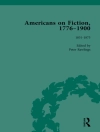This book offers a ground-breaking exploration of the aesthetics of poetic freedom. The range is broad, from antiquity to the present and from Europe and the Middle East into the poetry of the English-speaking world. Silent reading is shown as developing for the first time since the fall of the Roman Empire into a fashionable way of reading, starting with the invention of the sonnet in the High Middle Ages. The social use of the word “we, ” as when a society generalizes about itself, first appears in poetry in T.S. Eliot’s “The Love Song of J. Alfred Prufrock.” In Goethe’s “Roman Elegies” anachronism becomes a literary device—also, it seems, for the first time—introducing a novel timelessness essential to modern affirmations of infinity.
Revealing questions about the elusiveness of poetic freedom—what does the term actually mean?—are repeatedly tested against the accomplishments of major poets such as Whitman, Dickinson, Rilke, Dante and Virgil, and their public yet intensely private originality. The result is a fresh, and well-nigh revolutionary, way of seeing literary and modern history, or an initiation into the more striking gift of aesthetic freedom.
Cuprins
Preface: Among the Nightmare Lovers of Hades; 1 Eliot as Revolutionary; 2 Goethe and Modernism: The Dream of Anachronism in Goethe’s Roman Elegies; 3 Ezra Pound: The Solitary Volcano; 4 Does Time Exist?; 5 The Age of Authenticity: An American Poet in England; 6 Whitman and Wilde in Camden; 7 Dangerous Thoughts, Puzzling Responses; 8 Scaling the Wall; 9 Mass Death and Resurrection: Notes on Contemporary, Mostly American, Jewish Fiction; 10 Rilke, Einstein, Freud and the Orpheus Mystery; 11 Shrouds Aplenty (on poems of Janowitz, et al); 12 Ambushes of Amazement (on poems of Wakoski); 13 Dangerous and Steep (on poems of Jacobsen); 14 Small Touching Skill (on poems of Ponsot); 15 Language Mesh (on Paul Celan); 16 Sweet Extra (on poems of Cuddihy, Ray); 17 Maze of the Original (on translating poetry); 18 Approaching the Medieval Lyric; 19 Dark Passage (on poems of Stafford); 20 Mistress of Sorrows (on Ingeborg Bachmann); 21 The Innocence of a Mirror (on poems of Oliver); 22 Peskily Written (on Sade); 23 Is There Sex after Sappho?; 24 Saving One’s Skin (on medieval poetry); 25 Brilliant White Shadow (on poems and prose of Saba); 26 Serpent’s Tale (on Minoan archeology); 27 How Honest Was Cellini?; 28 The Poetry of No Compromises (on poems of Rehder); 29 Assigning Names (on poems of Nurkse); 30 History and Ethics: Bruni’s History of Florence; 31 Virgil’s Aeneid Made New (a translation by Robert Fagles); 32 Painting with Poetry (on the poems of Annie Boutelle); 33 Vampires and Freedom (on the work of Erik Butler); 34 How the West Learned to Read and Write: Silent Reading and the Invention of the Sonnet; List of Publications; Index.
Despre autor
Paul Oppenheimer is a professor of comparative literature and english at The City College and The Graduate Center of the City University of New York.












